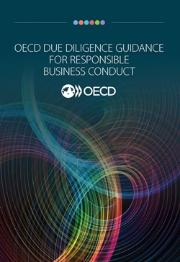OECD Due Diligence Policy Hub
|
Governments are increasingly using legislation and regulation as a policy tool to promote more responsible business practices and sustainable financial flows. New legislation, in particular on human rights and environmental due diligence in global supply chains, has emerged across multiple jurisdictions in recent years. Many governments have sought to use OECD responsible business conduct (RBC) standards to support common approaches across companies’ operations, supply chains and business relationships. This Due Diligence Policy Hub brings together technical papers, event information, tools and other resources to help policymakers in the design of legislation and regulation on due diligence for responsible business conduct. It is an important part of the efforts of the OECD Centre for RBC to help governments leverage the wide-ranging policy measures at their disposal to promote RBC, including in relation to RBC & public procurement, RBC & trade, RBC & investment, and RBC policy reviews.
|
OECD Due Diligence Guidance
OECD due diligence frameworks are the negotiated and government-backed global benchmark for due diligence. The OECD Due Diligence Guidance for Responsible Business Conduct, which was launched in 2018, has been adopted by 50 governments and promotes a common global understanding of supply chain due diligence for responsible business conduct. The Guidance details the specific steps and key characteristics of the due diligence process that have been agreed upon by policymakers, businesses - including investors - trade unions and civil society. The RBC due diligence guidance builds on sector-specific OECD guidances that have been negotiated and adopted by governments in the minerals, extractives, agriculture, financial and garment & footwear sectors. |
 |
|
OECD, ILO and UN OHCHR heads welcome EU leadership on environmental and social due diligence and urge alignment with international standards
8 March 2022 - The European Commission published a legislative proposal in February 2022 for mandatory corporate due diligence obligations with respect to human rights and environmental impacts. This far-reaching proposal builds on global standards of responsible business conduct, including the OECD Guidelines for Multinational Enterprises and related due diligence instruments. In a joint letter, OECD, ILO and UN OHCHR leadership welcome the European Commission's commitment to advancing the protection of human rights and the environment through due diligence and similar efforts across the European Union to strengthen the alignment of policy frameworks with global responsible business conduct standards. The letter underscores that coherence with international standards will help to create a more level playing field for conducting business worldwide, provide legal clarity and reduce costs for companies seeking to comply with similar laws in other regions. Most importantly, this coherence can help to minimise and prevent corporate involvement with harm to people and the planet and, where harms occur, facilitate access to an effective remedy. All three organisations emphasise their commitment to continue working with the European Commission and EU Member countries to advance shared goals on business and human rights, decent work and RBC more broadly. |
|
Papers
|
Company toolsTools and guidance to help companies comply with laws and regulations that are based on OECD RBC due diligence standards. |
|||||
Policy maker roundtablesPolicymaker roundtables hosted by the OECD on topics concerning RBC due diligence, including regulatory developments. The Policymaker roundtables provide an opportunity for policymakers from different jurisdictions to exchange on key issues, good practices and challenges related to regulatory developments and RBC due diligence in a closed setting.
|
Blogs and commentary OECD blogs and commentary on legal and regulatory developments relating to RBC due diligence. |
Follow us on social media & join the conversation
Contact: rbc@oecd.org
 @OECD_BizFin |
@OECD_BizFin |  LinkedIn Business and Finance at the OECD | #OECDrbc | #OECDduediligence
LinkedIn Business and Finance at the OECD | #OECDrbc | #OECDduediligence
Related Documents

